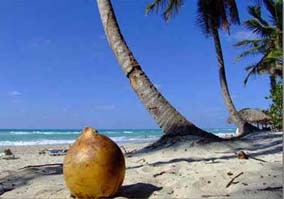US fears oil spill could reach Cuba
- Submitted by: admin
- Environment
- national
- 05 / 22 / 2010

WASHINGTON, USA (CMC) -- Officials in the Barack Obama administration are expressing concern that the massive oil spill in the Gulf of Mexico could spread damage to Cuba.
US State Department spokesman Gordon Duguid said that Cuba and the United States were holding talks on how to respond to the spill, underscoring concerns about the oil reaching a strong current that could carry it to the pristine white beaches of Cuba's northern coast.
The blown-out well has been spewing oil since the offshore drilling rig Deepwater Horizon exploded off the Louisiana coast on April 20, killing 11 workers and sank two days later.
It is still unclear just how much oil is spilling from the well but government scientists have been surveying the Gulf to determine if the oil had entered a powerful current that could take it to Florida and Cuba.
BP and the US Coast Guard have said that about 210,000 gallons of oil a day is gushing from the well. The official estimate of the amount leaked to date is six million gallons.
BP has tried several unsuccessful methods to contain the oil, but earlier this week managed to insert a tube into one of the leaks and says it has been sucking about 42,000 gallons a day to the surface.
Meanwhile, United States scientists said that light oil sheen has entered the Loop Current that flows north from the Caribbean Sea and east around the Florida peninsula.
The Loop Current is described as a "fast river of water" that circulates from the Caribbean Sea into the Gulf of Mexico and under the tip of Florida.
Scientists said that the sheen comes from the oil spill from a massive underwater leak in the Gulf of Mexico.
The US National Oceanic and Atmospheric Administration (NOAA) said planes first spotted the sheen on Tuesday.
University researchers and independent groups also have been tracking the sheen, amid concerns that the Loop Current could transport oil for hundreds of kilometers.
The oil could ruin beaches and marine habitats in several US states and Caribbean nations, they said.
Source: the Jamaican Observer
Comments